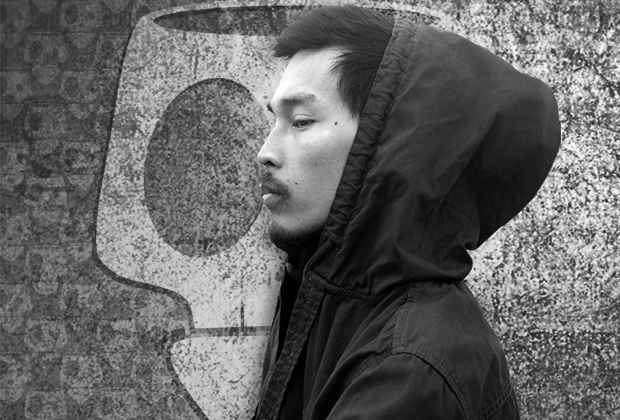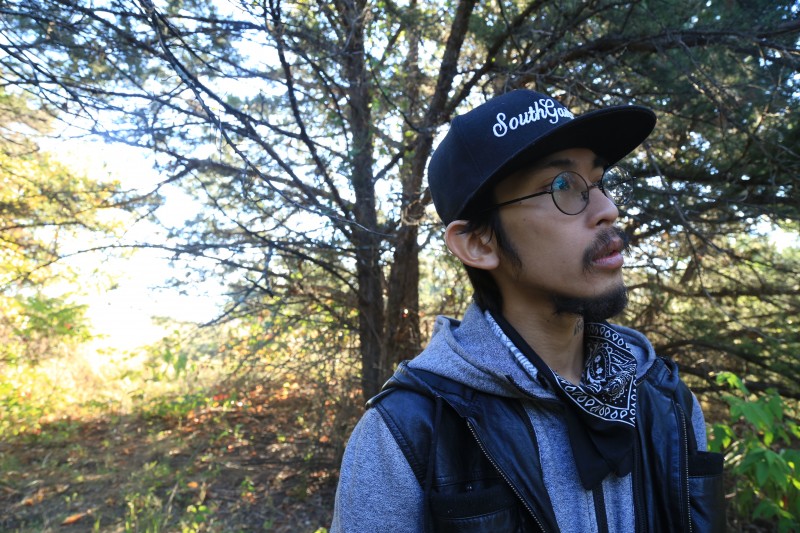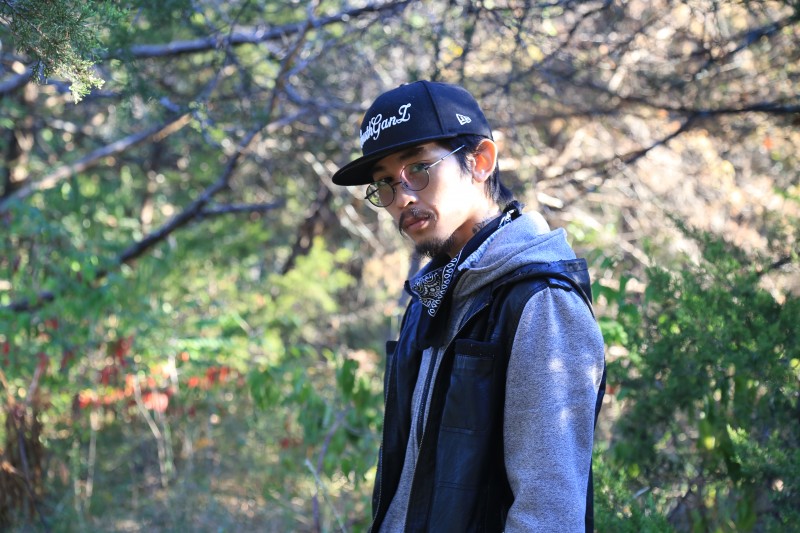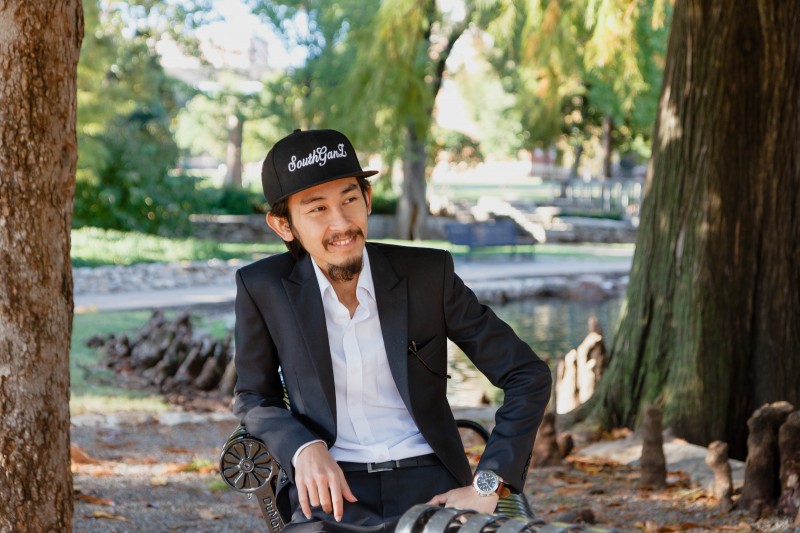When Vietnamese rapper Nah’s mom first heard his song, “DMCS (Dit Me Cong San / Fuck Communism),” she cried and begged him to take it off the internet. With over one million views on YouTube since January 2015, “DMCS” blatantly critiques the Vietnamese government as corrupt, greedy and oppressive towards Vietnamese people. It wasn’t long before high ranking cops and military officials showed up at Nah’s parents’ house in Saigon, demanding that they make Nah remove the song.
“They threatened my family,” said Nah, “saying that ‘If Nah keeps doing this and if he’s not taking down that video, very bad things gona happen to your family.’”
Nah refused.
“My dad is really mad at me,” said Nah. “He say, ‘Son, you have to think for family and take down the video.’”
Nevertheless, Nah remains fearless and affirms that nothing harmful has happened to his family since the threats.
Born Son Nguyen, the 24-year-old rapper chose his alias “Nah” from his Vietnamese nickname, “Nau,” which phonetically sounds like the English word “no.” Inspired by his roots and influenced by hip hop, “Nah” was born.
Nah’s early exposure to American music started with bootleg CD’s of the Backstreet Boys and Westlife. Then he got his hands on a copy of Linkin Park, and immediately felt drawn to the band’s rap verses.
“It sounded different,” said Nah. “I didn’t understand all the lyrics, but it’s aggressive and I liked that.”
For his 13th or 14th birthday, Nah’s uncle gifted him with a bootleg CD of Tupac — his very first rap album. From that point on, Nah’s foray into rap culture took off. He tapped into the internet and regularly joined online forums such as RapWorlds.com to learn about rap lyrics and how to write them. His early rap influences included Eminem, Jay-Z, Nas and Kanye West.
By ninth grade, he was recording his own rap songs and selling them on CDs to kids at school. In the process of discovering rap culture with the online community, Nah started to notice the limitations of his social consciousness.
“When I go to the forums online and talk about social stuff, I just feel kind of dumb,” said Nah, “like, people know too much and I don’t know shit.” This feeling of ignorance pushed Nah to ask more questions about his country’s history.
“[My generation] is all brainwashed,” said Nah. “The communist society build you up in the way they want you to be, they don’t want you to question things at all.”
During this time, one of Nah’s best friends by the name of “Pinky,” showed him how to climb the internet’s firewall in order to access government-censored websites about the war and dissenting perspectives of Ho Chi Minh.
“Pinky said, ‘Hey Nah, you gota read this, you gota read all this stuff because it’s really mind-blowing,’” recalled Nah. “So I read and read and read.” Growing up, Nah and his peers were taught that Ho Chi Minh and the Communist party saved Saigon from the French and Americans. “So we have to worship them,” said Nah. “We have been programmed to be like that since we were a kid.”
But Nah’s research on the internet gave a completely opposite opinion, that Saigon’s freedom was stolen by the Communist party. “I had a really big cognitive dissonance at that time,” said Nah. “I really didn’t know what to believe in.”
While these internet epiphanies felt new, Nah says they triggered old memories from when he was a young kid and sometimes overheard adults “outright curse” the Communist party. He recalls comments such as, “These bastards are the ones who came out from the jungle and took the whole country down.” Nah thought to himself, “This is awkward, how come [the adults] dare to talk about the party like this?”
When he asked what they meant, the adults said it’s not for kids to know. “But they were trying to protect us,” said Nah. “So when the internet came and I compared that [information which I read] to what everyone was saying, I started to get a glimpse into what was really happening.”
Nah began his own investigation and started asking random people — from the taxi drivers to food vendors — about what “really happened” during the Vietnam War. What he discovered was a general sentiment of resentment, bitterness and anger from the older generation towards the Communist party for “taking away and ruining” Saigon. Nah was shocked.
“Wow, is all of this true?” Nah questioned. “How can [there be] a truth like this, nobody talk about it?”
As angry as some people may feel, there is still a strong fear of speaking out against the government in Vietnam. “Because if you talk about this,” said Nah, “[People believe] you gona be disappear, you gona be thrown into jail, your family gona have problems and misery gona come to you and all that stuff.”
Wanting to expose the truth, in 2010 Nah began writing socially conscious rap songs and releasing them on the internet — but in a subtle, covert way. “If I just write my thoughts in my lyrics straightforwardly and release it online, it’s gona create trouble for me [with the government],” said Nah.
Strategically, Nah released songs in both Vietnamese and English. In the Vietnamese songs, he rapped about social problems such as poverty, gas prices and inflation — without being overtly critical of the Communist party. “But on the English songs, I would talk outright about starting a revolution,” said Nah.
Nah began making a name for himself in South Vietnam’s underground rap community — joining one of the biggest rap crews, “SouthGanZ.” The founders of SouthGanZ, Wowy and LD, mentored Nah in his rap career and they would eventually work on several radical collaborations together.
In 2012, Nah released an album titled “No 1 Tu Lover” which was “revolution” spelt backwards. While attempting to stay under the radar, the goal was to “teach people to think critically, teach people to use their brain,” said Nah. “That’s how people gona find the old truth.”
“Wow, is all of this true?” Nah questioned. “How can [there be] a truth like this, nobody talk about it?”
His music and message spread. By 2013, Nah got signed to a California-based, Vietnamese-owned record label, “Lang Van,” along with his mentor, Wowy; by May, they were invited to perform at a festival organized by the U.S. ambassador in Hanoi. Together, Nah and Wowy took the stage and feeling protected by the U.S. embassy, they performed “Sai Gon Dep Lam (Saigon Is So Beautiful)” and attacked the cops for their corruption in Vietnam.
The lyrics (translated), “You don’t fear the robbers but you fear the popo / Where they sell drugs, where they sell sex, you see them come and go / My boss has to pay taxes to make the city grow / Oh beautiful Saigon,” suggest that cops are involved in Vietnam’s drug and sex trades through bribery, Nah says.
“The crowd [of young people] was really into the songs,” said Nah. “We kind of stole the show.” They also made waves in the press that day, with “Nguoi Lao Dong” (The Worker’s Newspaper) and several other Communist-owned media attacking Nah and Wowy as “bad guys with garbage music.”
“They just bashed us,” said Nah. “But bad press is good press.”
After Nah’s controversial performance in Hanoi, things started to fall apart with his record deal. His manager from Lang Van flew back to California to avoid negative backlash from the Communist party. In addition, Nah couldn’t get permission to release any more politically-driven songs through his record label.
“After the incident in Hanoi, I’m gona change plans,” said Nah. “I didn’t see a career in music in Vietnam. So I decided to go to the States and study, make connections over there and see if we can expand our music to the States.”
By Fall 2013, Nah arrived at Oklahoma State University and deepened his understanding of revolutionary politics through studying social movements and iconic leaders such as Martin Luther King, Jr.
Feeling inspired, Nah and his SouthGanZ crew mates wanted to organize an unprecedented rap track. Led by SouthGanZ founder, LD, they organized a track with six Vietnamese rappers called “Lam Viec Nuoc (Let’s Talk Politics),” which took a sarcastic approach in criticizing the Vietnamese government — describing politicians as party animals drinking and smoking weed. The song garnered so much attention, that three of the original rappers quit the project out of fear of negative repercussions from the government.
While the song itself, “Lam Viec Nuoc,” was not explicitly political, Nah ignited political commentary and dialogue online around the sarcastic lyrics. Since he was living in the United States, Nah no longer felt a need to censor himself. “[At this point] I’m just gona be very political and talk about it straightforwardly,” said Nah. “A lot of people paying attention and saying we are traitors and shit. [The song] become bigger than we thought.”
Seeing an opportunity to capitalize on the momentum of “Lam Viec Nuoc,” Nah said, “It’s time to write that song that I’ve always been wanting to write … let’s crack this masterpiece and blow the internet away.”
Nah worked on “DMCS” for a month and simultaneously, wrote a manifesto for his revolution to go with it. His infamous song “Fuck Communism” published on YouTube on January 13, 2015 and as he expected, the song blew up. “The rest is history,” said Nah.
While his music career reached a peak milestone with over 1 million views and 10,660 YouTube subscribers, his grassroots revolution called “DMCS / Zombie Movement,” is steadily growing. Nah’s closest confidantes — Sang Dang, Huy Nguyen, LD and Khang Nguyen — are his round table of revolutionaries who have been instrumental to the movement from the beginning, he says. “There’s not one leader,” said Nah, who believes in a de-centralized movement of many leaders.
The song “DMCS” has been a successful tool to galvanize the youth in Vietnam and spark their critical consciousness.
“There are at least 10 remixes of DMCS,” said Nah. “This shows that people starting to become more political, more outspoken.” Naturally, not everyone is anti-Communist in Vietnam. Pro-Communist rappers battle Nah and his crew, which ultimately works out in his favor, Nah believes. “The more we battle, the more attention the whole movement raises, so people become more aware of political issues and problems in Vietnam.”
With school no longer the top priority, Nah is spending most of his time planning and organizing the revolution from Oklahoma where it’s safer, he says. He uses his Facebook page — which has 58,726 followers — as the primary platform to promote his message and calls-to-action. Youth in Vietnam show their support by spray painting “#DMCS” graffiti in the streets, making “#fuckcommunism” cellphone cases and even permanently tattooing “#DMCS” on their bodies.
In addition to teaching people how to think critically, Nah says one of the immediate goals of the movement is to abolish Article 4 in the constitution, which states that the Communist party will be the only ruling party in Vietnam.
“We just wana give more power to the people,” said Nah.
Part of this liberation, Nah believes, lies in the usage of natural drugs to mentally free a brainwashed generation. Having researched the effects of drugs on the human mind and the influential role drugs played in 1960s – ‘70s America, Nah has encouraged his friends in Vietnam to grow hemp and distribute psychedelic substances to the people.
With plans to return to Vietnam during Summer 2016, Nah believes that his movement will continue to grow with social and economic power. However, just last month, authorities showed up at Nah’s parents’ house with threats against his family.
When asked whether or not he would consider stopping his movement, Nah said, “It’s almost finished.”
https://youtu.be/xnWxFIH4_dE



